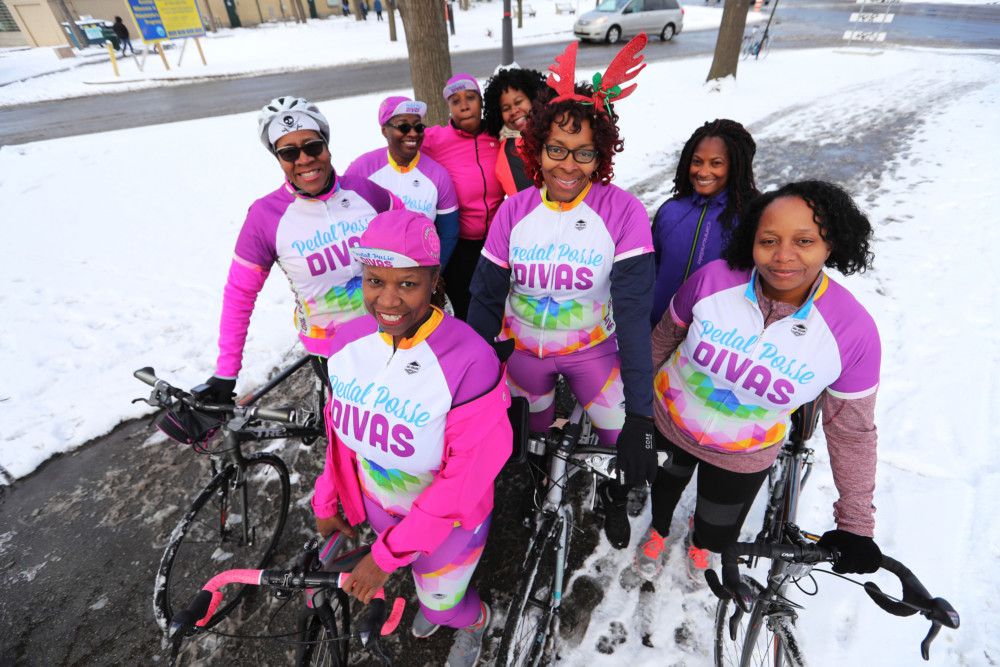By Juliana Feliciano Reyes
The Philadelphia Inquirer
WWR Article Summary (tl;dr) Back in 2014 just eight women showed up for the first bike trip along the Schuylkill River Trail. Three years later, the “Pedal Posse Divas”, as they’ve named themselves, have grown to a Facebook group of 300.
The Philadelphia Inquirer
Stephanie Ford’s first group bike ride was lonely.
The 47-year-old legal assistant, who’s always looking for ways to stay active, joined a crew she had found online for a 25-mile circuit along the Schuylkill River Trail. But she quickly fell behind, and soon watched as the other cyclists biked out of view.
“I felt like, ‘Nobody’s here with me! I’m on this trail all alone,’ ” she recalled.
She still liked the idea of cycling with others. So Ford reached out to a few friends, including some from the running group Black Girls Run, to get together for a bike ride.
Eight women showed up for that first trip in 2014. Three years later, the Pedal Posse Divas, as they’ve named themselves, have grown to a Facebook group of 300.
Sometimes they draw as many as 30 women for their outings, which range from 11-mile Friday morning rides to two-day, 76-mile rides to a farm outside of Phoenixville, Pa., as part of an annual camping trip called Bikeout.
While the 4,000-plus Facebook group Women Bike PHL has helped build community for women cyclists in the city, the Pedal Posse Divas’ demographics are still something of a rarity: black women older than 30. (One member is 63.)
It wasn’t an intentional choice, and all women are welcome, Ford said, but this is how the group happened to develop over the years, likely because its early members were black. This collective identity has led group members to rally around a shared goal: getting more black women on bikes.
“We want more and more black women, and women in general, to ride,” said Sonja West, a 50-year-old Verizon technician who leads the Friday morning rides. “You don’t see many black women on bikes.”
Why? A number of reasons, all of which can be traced back to a history of racism. Among them: poor bike infrastructure in black neighborhoods, the idea of car ownership as a status symbol, a lack of representation in bike advocacy groups. Think of how the city’s Indego bikeshare has struggled to get black and lower-income people to use its bikes. “The majority of conversation is, ‘This isn’t for us,’ ” Indego bike ambassador Kim Smith told Billy Penn in 2016.
West says cycling was never an activity she saw a black woman like herself doing.
For that reason, when the Pedal Posse Divas take to the streets for neighborhood rides wearing their matching violet jerseys and shorts, it feels like a political act.
“If you don’t see it, you don’t think it’s possible,” West said.
Though it wasn’t Ford’s initial intention to do so, her group has become part of a larger national movement to get more black people to ride. Other similar organizations include the collective Red Bike and Green, which has chapters in the Bay Area, Atlanta and Chicago; a consultancy in Brooklyn called the Brown Bike Girl; and a nearly 30-year-old Philly-based group called the Bikin’ Blazers.
For the Pedal Posse Divas, West is the group’s “sweep,” riding with the newcomers who feel a little intimidated and making sure no one gets left behind. Another member, 56-year-old retiree Beverley Reddick, is the technical one, who will explain the different gears or how to fix a flat. Ford is the cheerleader. She’s always encouraging women to get bikes or to take on longer rides.
And yes: The group is only for women, though every so often, someone brings her husband and “eyes roll,” Reddick said.
“But I don’t mind,” she added. “I encourage them to earn their keep.”
The collective power of biking with a group is just as much about safety as solidarity: This month, Becca Refford, a web designer who lives in South Philadelphia, was hit by a box truck, a little more than two weeks after pastry chef Emily Fredricks was killed when a private garbage truck struck her. Ford spoke at the vigil for Fredricks about bike safety and how scary it can be to ride on the street.
“I have so much confidence when I ride with the group,” Ford said later. “It’s like, ‘We can take the lane! We own this street!’ ”
It’s a spirit that translates to all the bike rides they take.
It’s a “sisterhood,” West said. “We take care of each other.”














































































































































































































































































































































































